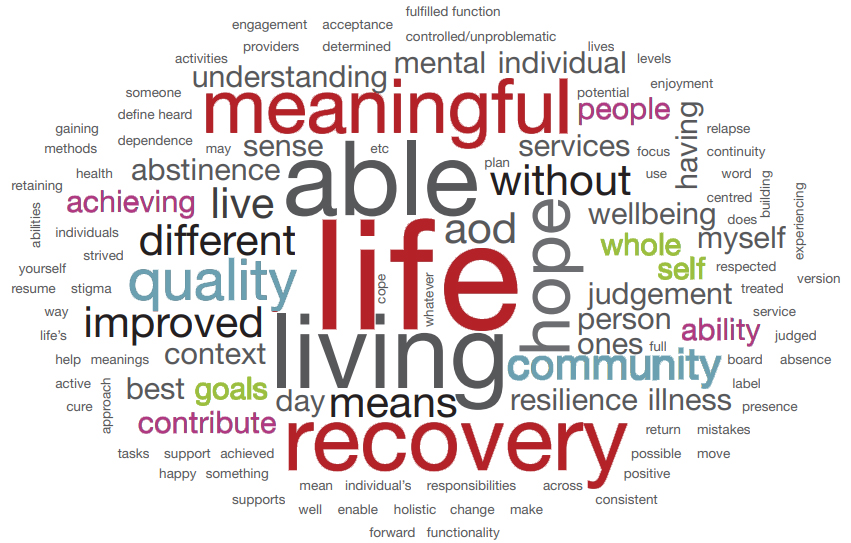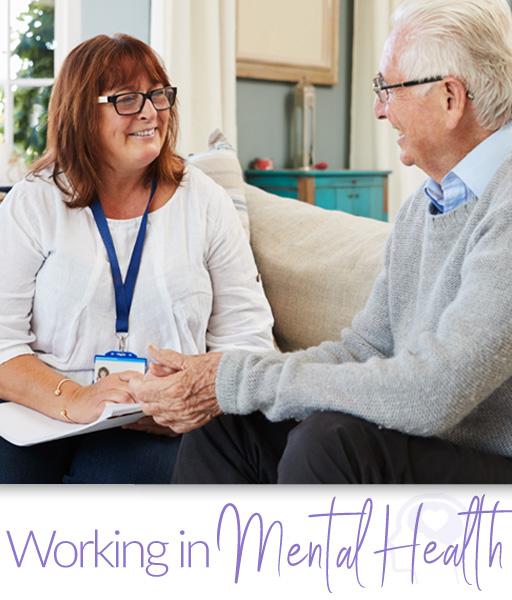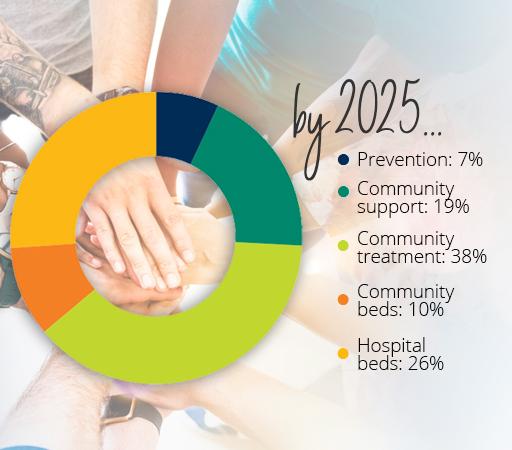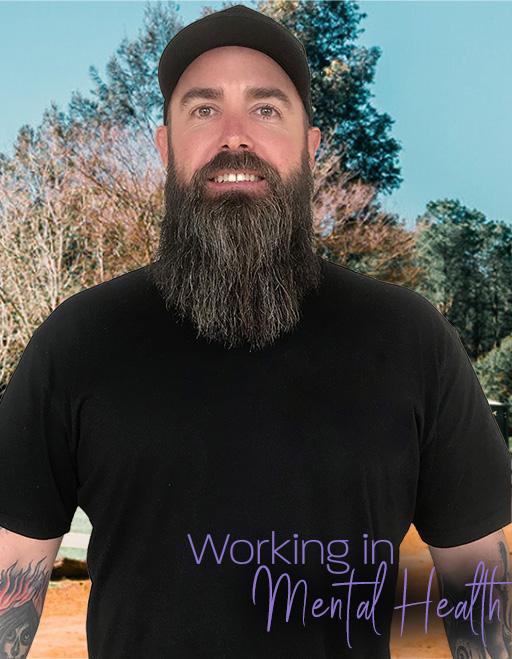Would you like to work in a job where you're helping people to reach their full potential and enjoy a healthy and fulfilling life? A career in mental health can offer you that, and so much more!
Mental health is a complex area. Although 80 per cent of the population is mentally healthy, one in five Australians will experience mental health issues at some point in their life1. From the three million Australians who are living with anxiety or depression2 to people of all ages and stages of life with mental health conditions that affect their ability to function day to day in a positive way, and those who need support to cope with loss or grief or are struggling to overcome addiction or a difficult or challenging situation, there's a wide range of support needed and many opportunities for you to make a difference.
You could be working directly with individuals or families, providing services in the community, or part of a team in a mental healthcare setting. Whether you're looking for an entry-level job or making a career change, you're entering a field with fantastic opportunities that can offer you a highly rewarding and stable career.
What working in mental health can offer you
|
|
|
|
|
|
Follow the links to find out more about the industry, job and career opportunities, and training options.
1 Source: Australian Mental Health Commission
2 Source: Beyond Blue; 2020
Industry information
- A world of opportunities and experiences
- What is mental health?
- Why support is important
- WA's mental health care framework
- WA State Government focus on mental health
- Recovery-focused practice
- WA's mental health workforce
- Community support services
- Mental health support with the NDIS
- Spotlight on: Recovery Coaches
Jobs and careers in mental health
Do you need to skill up?
- Training options and pathways
- Free mental health training
- Free healthcare and community services training
- Reduced fees for mental health qualifications
- Other options to start your career in mental health
- Browse our list of mental health courses
- Looking for advice on training, jobs or careers? We can help!
A world of experiences and opportunities
This short video from the Western Australian Department of Health features nurses who specialise in the area of mental health, sharing their stories. It provides some valuable insight into the kind of work you could be doing and the rewards and opportunities it can offer. Whilst nursing is one particular pathway for a career in mental health, the experiences of these nurses would be shared by others in the sector including mental health workers across the community and in a range of areas such as those listed below.
- Advocacy, education and prevention
- Alcohol and other drugs support and counselling
- Community-based support and treatment
- Early intervention and community counselling
- Family and relationship counselling
- Home-based and residential care
- Hospitals, clinics, and specialist facilities
- Offender management programs
- Outreach services in rural and remote areas
- Recovery support, respite care and rehabilitation programs
- Social work and community support
- Suicide prevention and crisis care
- Supporting people in employment
- Workplace mental wellbeing programs
- Youth support
How we can help
Jobs and Skills Centres are located across regional and metropolitan WA, and they can help with advice and support about all things jobs, careers and training.
An experienced careers specialist at your local JSC can help with all aspects of career planning and decision making, and offer information and support to help you choose the best pathway into working in mental health.
All services are free!
Call your local JSC on 13 64 64, or find your nearest JSC via the link below and drop in for a chat.

What is mental health?
Just like we have our physical health, we also have mental health.
| According to the World Health Organisation, mental health is “a state of well-being in which every individual realises his or her own potential, can cope with the normal stresses of life, can work productively and fruitfully, and is able to make a contribution to her or his community.” |
Mental health is critical for being able to function well in all areas of life — both personally and professionally — to process information and make decisions, enjoy hobbies and interests and socialising, to be motivated towards completing tasks, and to have meaningful social connections, positive self esteem and the ability to cope with challenges and changes.
A mental health issue interferes with a person’s ability to function in "normal" ways; and with the way they think, the way they handle situations, their interactions with other people (their cognitive, emotional or social abilities) and their perception of their own self value.
There are different types of mental health issues that people can experience, and each of them may have a varying degree of severity — from very mild, through to extremely debilitating. Some issues can come and go, others can be lifelong.
Examples of mental health issues include depression and anxiety, severe grief, eating disorders such as anorexia, and personality disorders such as bipolar, agoraphobia, or schizophrenia.
Mental health issues can be caused by a number of things. For some people, a traumatic or difficult experience such as the death or illness of a loved one, a divorce or relationship breakup, family problems or a significant change in their life's circumstances can bring about issues with mental health. Others may have a pre-disposition towards mental health issues, this may be genetic or due to their personality type.
Some mental health issues are related to lifestyle; such as the misuse of drugs or alcohol, and sometimes it's purely a response to dealing with the challenges we face in our lives.
Recently, mental health issues in Australia have increased due to loneliness and isolation and the sense of concern felt by many people as a result of COVID-19.
Why support is important
Many people experiencing mental health issues cannot simply "get over it" — they need support and assistance. When individuals experiencing a mental health issue receive the right combination of treatment and support, and feel more confident about being able to improve the situation, they often can and do recover to positive mental health. As a mental health worker, you will often be the first line of support for a person experiencing mental health issues.
Mental health issues can affect anyone — people of all ages, and at all stages of life.
Younger people can be particularly vulnerable, as they try to navigate the challenges that growing up present. In this short video from headspace.org, a group of younger people discuss what mental health means to them, their experiences with mental health issues and how it has impacted not only their own lives but also their friends and family.
Whilst this video features younger people, the challenges they describe apply to people of all ages and stages of life. It gives some insights into how it feels to experience mental health issues and the way they can impact a person's life.
WA's mental health services framework
The State Government's Mental Health Commission released Better Choices, Better Lives: A Western Australian Mental Health, Alcohol and Other Drug Services Plan 2015—2025, to outline the services required to meet the needs of Western Australians until the end of 2025. The plan, which was updated in 2018, provides an overview of mental health (including AOD) in WA, and established a framework that describes the services within our mental healthcare system. These services fall broadly into the categories shown in the diagram below, and focus on the spectrum of service — from prevention through to recovery.

The framework outlined in the plan provides a useful reference for the different types of work that take place across the sector, and represents a recovery-focused practice model. You can view the full plan here, on the Mental Health Commission's website.
Recovery-focused practice
During the development of the WA Mental Health Commission's Better Choices Better Lives mental health plan, participants in the community support consultation forum were asked what recovery meant to them. A summary of the words used is provided in the graphic below, which highlights the importance of — amongst other things — living a meaningful life with hope and goals, and community.

In recent years, mental health support and care has focused on "recovery-based practice". In simple terms, this means that all efforts throughout the spectrum of mental health support and services must be focused on the goal of recovery.
|
From the perspective of the individual with mental illness, recovery means: "being able to create and live a meaningful and contributing life in a community of choice with or without the presence of mental health issues". |
Helping people to find the right combination of services, treatments and supports and eliminating discrimination by removing barriers to full participation in work, education and community life is the key to recovery. As a mental health care worker, your application of this framework will contribute to improved mental health and wellbeing as people are supported in new ways to lead fulfilling and contributing lives.
Principles
Within the framework, six principles of recovery oriented practice ensure that services and support are delivered in a way that supports recovery for individuals, helping them to achieve personal autonomy, social identity, meaning and purpose in life, and a positive sense of self. These principles are as follows.
|
1 2 |
Uniqueness of the individual Real choices |
3 4 |
Attitudes and rights Dignity and respect |
5 6 |
Partnership and communication Evaluating recovery |
Practice domains, and capabilities
In practice, the recovery-oriented model is based around the application of sets of capabilities that support people to recognise and take responsibility for their own recovery and wellbeing; and to define their goals, wishes and aspirations in a way that::
- recognises and embraces the possibilities for recovery and wellbeing created by the inherent strength and capacity of all people experiencing mental health issues;
- maximises self-determination and self-management of mental health and wellbeing; and
- assists families to understand the challenges and opportunities arising from their family member's experiences.
There are 17 capabilities in total, and these are grouped into five fields known as 'practice domains'. The first is an overarching domain that relates to all capabilities.
Five domains: 17 capabilities
| DOMAINS |
|
|---|
| Domain 2: Person first and holistic | Doman 3: Supporting personal recovery | Domain 4: Organisational commitment and workforce development | Domain 5: Action on social inclusion and the social determinants of health, mental health, and wellbeing | |
| CAPABILITIES | Holistic and person-centred service | Promoting autonomy and self-determination | Recovery vision, commitment and culture | Supporting social inclusion and advocacy on social determinants |
| Responsive to Aboriginal and Torres Strait Islander people | Focusing on strengths and personal responsibllity | Acknowledging, valuing and learning from lived experience | Challenging stigmatising attitudes and discrimination | |
| Responsive to gender, age, culture, spirituality and other diversity | Workforce development and planning | |||
| Responsive to lesbian, gay, bisexual, transgender and intersex people | ||||
| Responsive to families, carers and support people |

Fast facts: WA's mental health workforce
Mental illness has been recognised as a major health concern in Western Australia, with approximately half (45%) of all Western Australians likely to experience one or more of the common mental health disorders at some point in their lifetime. One in five people in WA aged 16 to 85 (21%) have experienced mental issues in the past 12 months3.
In Western Australia, mental health services cover support and services for a range of general issues as well as in specific areas such as suicide prevention and alcohol and other drug (AOD) services. Services are delivered through both in-home and community-based services including counselling, as well as through acute and specialised services in hospitals and other healthcare settings across private, non-government and government service providers. Services are delivered in a range of settings from peoples’ homes and communities through to specialist inpatient services, and across all stages of life.
The mental health and AOD workforce is made up of a range of job roles, organisations and agencies and includes people whose primary role is the delivery of mental health and AOD services and programs (specialist mental health and AOD workers), as well as staff from other relevant generalist health and human services (generalist workforce).
Mental health workers come from a diverse range of backgrounds and experiences. Support workers are traditionally predominately female; however this is rapidly changing with many men joining the sector in recent years.
The average age is around 40 years, due mainly to the importance of personal maturity and life experience for this kind of work, however this too is changing with many younger people entering the sector.
More than half of all employees are full time workers; however the sector also offers a range of part time and casual employment options.
Mental health offers a range of job and career opportunities — for entry-level workers through to medically trained professionals such as psychiatrists and psychologists.
The kind of jobs you could get will depend on your skills and experience, and in some cases whether you have a qualification. Occupations within the sector include youth workers, peer support workers, counsellors, social workers, individual support workers, recovery coaches, prevention specialists, and nurses.
Mental health support is part of the healthcare and social assistance sector, which includes many private organisations as well as charity or community-based organisations.
A large proportion of the mental health workforce in WA is employed by Health Service Providers (HSP), with approximately 35,000 full-time equivalent (FTE) employed in 2017—18 (source: WA Mental Health Commission). Support and services are also provided at residential facilities including transitional housing such as hostels and recovery houses.
A range of services are also provided through WA State Government agencies; such as mental health support for adults and juveniles in our prison system, for people with drug and/or alcohol issues, youth, LGBTIQ people, victims of family or domestic violence or abuse, people in crisis or at risk, transient or homeless people and those living in remote areas; as well as specialised cultural services for Aboriginal and Torres Strait Islander peoples and migrants.
There is also a range of opportunities in the area of prevention and promotion; working on education programs, events and campaigns to promote mental wellbeing and educate the community about mental health.
Yes! In fact, the healthcare and social assistance sector across Australia is one of the highest jobs growth sectors. It currently employs approximately 1,809,700 persons — 13.9 per cent of Australia's total workforce. Over the past five years, employment in the industry has increased by 19.3 per cent4.
Expected employment growth across the sector to 2025 is projected at over 14 per cent, which represents almost 250,000 new jobs5.
Mental health nurses are particularly in demand, with the WA Department of Health actively establishing more positions across the State.
Working in mental health offers fantastic opportunities if you wish to progress your career. Many people start off in an entry level position within the sector, then — through experience and/or further training — progress to more senior roles or into specialised areas of mental health support.
There's also options to move between specialisations — for example; you may start off working with youth, but then move into drug and alcohol counselling.
The skills and experience you gain working in mental health are also highly transferrable to other areas within the healthcare and social assistance sector; such as aged care or disability support.
3 Source: WA Department of Health
4 Australian Bureau of Statistics
5 Source: Labour Market Information Portal (LMIP) May 2021
Community support services: Keeping people connected and close to home
Community support services provide individuals with access to the help and support they need to participate in their community. This can include programs that help people identify and achieve their personal goals, personalised support programs such as assisting people to access and maintain employment or education and social activities, peer support, initiatives to promote good health and wellbeing, in-home support to attain and maintain housing, family and carer support (including support for young carers and children of parents with a mental illness), flexible respite, individual advocacy services and harm-reduction programs.
Community support services for people with a mental illness are recovery-oriented, and designed and delivered as part of a personal recovery journey. They include a focus on the important role of families and carers in a person's recovery, and aim to keep an individual connected with his or her local community.
Future growth and opportunities
Through the Mental Health Commission's Better Choices Better Lives plan, the WA State Government has identified the need to expand funding for community mental health support services across the state; from 3.2 million in 2015, to 6.3 million hours by 2025. Dedicated community support services for children and young people are also a high priority, as is expanding community services for people living in regional areas.
The pie graph at left shows the ideal makeup of services to be in place by 2025. Through building the capacity of the community services system, individuals can be supported to stay at lower risk of harm and obtain recovery-focused support earlier, in an environment best suited to their needs.
All this growth in community support services means great job and career opportunities ! Working in community services and support can offer many fantastic job and career options, and many people find it very fulfilling as they are able to work more holistically on a person's care.
There's a great range of occupations in community services and support— take a look at What are the main occupations? to see a list of just some of them.
Working in mental health: Hayden's personal journey
Hayden's own journey with mental health issues led him to choose working in mental health, which he started by studying for a Certificate IV in Mental Health qualification. Here, he shares his personal story of how at age 40 he's found a new career and is now using his own life experience to help others.
"In 2016 my position working for an international recruitment company was made redundant. I took this pretty hard, and within six months I was diagnosed with major depressive disorder and severe anxiety. I turned to drugs and alcohol, and in August 2019 after losing almost everything I entered a residential rehab; Tenacious House.
I completed the program in January 2020, and started studying at North Metropolitan TAFE in February 2020 as I had found that I needed to learn more about mental health and use my experience to help others who are experiencing mental health issues.
The best thing about studying mental health, and now working in the industry, is that I get to walk alongside others in their recovery journey. I get to help other people overcome life barriers, set and achieve personal goals and help them see their own potential.
I now work as the Mental Health Outreach Support worker for Tenacious House, and I am currently studying a Certificate IV Community Services and Certificate IV Mental Health Peer Support."
Mental health support with the NDIS
 The National Disability Insurance Scheme (NDIS) was established in 2013, to fund support for over 4.3 million Australians who have a disability. It offers people with intellectual, physical, sensory, cognitive and psychosocial disability funding to to access disability services and supports alongside their mental health treatment, as well as information and connections to services in their communities. A mental health service provider can become registered with the NDIS, enabling them to work with individuals who are receiving NDIS funding.
The National Disability Insurance Scheme (NDIS) was established in 2013, to fund support for over 4.3 million Australians who have a disability. It offers people with intellectual, physical, sensory, cognitive and psychosocial disability funding to to access disability services and supports alongside their mental health treatment, as well as information and connections to services in their communities. A mental health service provider can become registered with the NDIS, enabling them to work with individuals who are receiving NDIS funding.
The NDIS defines a psychosocial disability as "a disability that may arise from a mental health issue." and its services are around two models.
- General support to provide individuals with information; referral to services; and connections with local support groups, clubs or programs, government services, and local or community-based supports
- Individualised support based on a plan developed between the individual and the NDIS, which may include funding to access support services
Individuals with allocated funding can select a registered NDIS service provider to manage and provide their support, or they can self-manage their NDIS funding and negotiate the supports specified in their agreed plan.
A person's NDIS funding may be used to employ support workers directly to assist them in achieving their mental healthcare goals, or paying for supports that will improve their mental health in one or more of three areas.
- Helping to build independence and skills — For example; employing a personal trainer to help with health and fitness, or doing a course at TAFE to improve employment prospects (capacity building);
- Assisting with daily living — For example; employing a personal support worker, or paying the cost of transport that enables the person to travel to community or social events (core); and
- Investing in or purchasing things needed long term — For example; assistive technology or making physical changes to the home environment (capital).
Spotlight on: Recovery coaches
To support mental health recovery, a Recovery Coach is one of the supports a person with psychosocial disability can access under NDIS funding.
Recovery Coaches focus on increasing an individual's social and economic independence, supporting and empowering them to have greater participation in managing their lives, and collaborate with other services to support these outcomes.
They are a key part of the community support aspect of recovery, and all aspects of their work involve the application of the principles of recovery-focused practice. They work together with individuals, their families, carers and other services and organisations to design and implement a recovery plan, and assist with the coordination of NDIS and other supports.
To become a recovery coach, you would need to have completed a Certificate IV in Mental Health or Mental Health Peer work or similar training, and/or have experience in supporting people with mental health challenges.

How do I get a job in mental health?
Now is a great time to consider a career in mental health! Because there's a wide range of occupations within the sector, and a number of different areas you could specialise in, it's helpful to know about different occupations and the kind of work they involve. What will be a good fit with who you are and what you want for your future? Will you need new skills to get into a particular occupation or job?
What are the main occupations?
Working in mental health offers a wide range of jobs, job roles and occupations — select the box below to see some of the main ones.
| The job | What you'll do | How to get there |
|---|---|---|
| Advocacy | Mental Health Advocates (MHAs) work to represent people with mental health issues, or with people who need assistance to protect their legal and individual rights, help them to express their own wishes, and say what they want to happen. In WA, these services are coordinated through Mental Health Advocacy Service (MHAS). In 2019—20, MHAS assisted over 3,400 people. | A qualification such as the Certificate IV or Diploma in Mental Health would be required, and/or experience working in mental health. |
| AOD worker | Specialises in the treatment of issues related to the use or misuse of alcohol and other drugs (AOD) | A Certificate IV or Diploma in Alcohol or Other Drugs for entry level work, through to university level qualification for specialist roles. Training as a counsellor may be required for some roles. |
| Community worker | This is a key role within the mental health services workforce, as it works with individuals, families and groups in the community — facilitating support and services to assist clients to meet their individual goals toward wellbeing and/or recovery. | A qualification such as the Certificate IV or Diploma in Mental Health would be required. |
| Counselling | A counsellor can work with individuals, families or groups in a variety of areas; from social work and community support, through to youth support, family counselling or drug and alcohol counselling. Counsellors may also work on "hotline" services such as Lifeline or the Kids Helpline. | Generally, a certificate IV or diploma in counselling qualification is required. Alternative pathways may include a qualification in an area such as youth work or community services. |
| Enrolled nurse | Provides general health care and nursing support; generally in a hospital or residential care facility although nursing services can be provided in-home. | A Diploma of Enrolled Nursing qualification is required. |
| Forensic psychiatrist | Forensic psychiatry is a specialist area. These medical professionals diagnose and treat prisoners and criminals who suffer from mental disorders, and may also be responsible for assessing the mental condition of victims of violent crime. | A university degree is required, to become a licensed psychiatrist, with further study required to specialise in forensic psychiatry. |
| Mental health nurse | A mental health nurse (or Clinical Nurse Specialist) is typically a licensed and trained nurse who has chosen to specialise in psychiatric care. Mental health nurses work with other mental health and medical professionals including GPs, psychiatrists, psychologists and counsellors to follow the treatment plan prescribed for each patient in their care. | Complete the required training to become an enrolled or registered nurse. Additional training is then required for the mental health specialisation. |
| Mental health outreach worker | Mental health outreach workers act as liaison between patients, their families and other mental health professionals. They provide support and advocacy for patients. | Generally, a Certificate IV in Mental Health or a Certificate IV in Mental Health Peer Support qualification is required. |
| Mental health support worker | A support worker provides a range of mental health support for clients in contexts such as community based non-government organisations, outreach programs, centre-based or residential rehabilitation programs, respite care, in-home services, clinical or hospital settings or workplace programs. | Generally, a Certificate IV in Mental Health or similar qualification is required. |
| Peer support worker | A peer support worker is the same role as a mental health support worker, but is specific to someone who has lived experience of mental health issues and utilises that experience to help others. | Generally, a Certificate IV in Mental Health Peer Support qualification is required. |
| Prevention | Prevention strategies aim to minimise the impact of mental health issues on individuals and communities. Work in this area may include support and services for individuals at risk or young people, as well as in the area of suicide prevention and counselling. | Generally, a Certificate IV in Mental Health or a Certificate IV in Mental Health Peer Support qualification is required. University-level qualification may be required for more specialised work in the area of prevention. |
| Promotion | This work involves the promotion and/or delivery of mental health and recovery education programs and/or campaigns to help educate students, teachers, parents and the community, raise awareness and reduce stigma about mental health issues, and reduce alcohol and other drug related harm. Examples include the Commonwealth Government's Head to Health, the State Government's Healthy WA; and the Act, Belong Commit and Think Mental Health initiatives in WA. | Generally, a university level qualification in health marketing and promotion is required. Experience in a public relations or marketing role may be suitable for an entry level role, depending on the job requirements. |
| Psychiatrist | Psychiatrists are formally trained medical doctors who specialise in mental healthcare. They diagnose illness, manage treatment and provide a range of therapies for complex and serious mental illness. A psychiatrist can prescribe medications. | A university degree is required, to become a licensed psychiatrist. |
| Psychologist | A psychologist is a healthcare professional specifically trained to determine whether individuals are suffering from cognitive, psychological or emotional disorders. Psychologists develop treatment plans focused on solutions for beneficial outcomes, but do not subscribe medication. | A university degree is required, to become a licensed psychologist. |
| Public health worker | Mental health workers who enjoy community education and interaction can take roles within public health campaigns associated with mental health and wellbeing. They can work on public presentations and education programs, policy development, and delivering training to other social services and health professionals. | A qualification such as the Certificate IV in Mental Health, and relevant experience in the sector. |
| Recovery coach | A Recovery Coach, available through NDIS funding, provides support to people with psychosocial disability to live a full and contributing life. They assist individuals to take more control of their life and better manage some challenges of day to day living, working with the individual and their family, carers and supports to create and implement a recovery plan. | Generally, a Certificate IV in Mental Health or a Certificate IV in Mental Health Peer Support qualification is required. |
| Social worker | A social worker specialises in helping individuals with issues that affect their everyday lives, including mental health. Social workers don’t diagnose patients or administer treatment, but instead provide information and support to clients. | A university-level qualification (degree) is required to be a social worker. Industry experience and/or a Certificate IV or Diploma level qualification in community services, mental health or similar could provide a good pathway into university. |
Explore occupations in mental health
Because the field of mental health offers a range of different occupations and job roles, it's useful to explore these further so that you can decide on the kind of work you're interested in doing.
We have hundreds of occupation profiles you can browse through here
Specialist occupations in high demand
Over the next five years, mental health services in Western Australia through the Department of Health will be significantly expanded. Skilled and experienced mental health professionals are needed to supplement our dedicated mental health workforce across acute care and community-based services. These include roles such as consultant psychiatrists, addiction medicine specialists, mental health nurses (ENs and RNs), aboriginal health workers, social workers, clinical psychologists and neuropsychologists, and occupational therapists.
Spotlight on: Mental health nurses
Whilst some occupations require specialist university-level qualifications and experience, mental health nursing offers an excellent career pathway where you will provide care, counselling and support for people with a range of conditions including depression, anxiety, and eating disorders. Mental health nurses work in a variety of settings — including clinics, hospitals, and specialist facilities — and in partnership with the patient, their family, and the wider community.
In April 2021, the WA State Government announced that 100 new mental health nurse positions will be created, with more to come over the next few years. WA Health has also recently launched the Mental health 80 initiative (MH 80), which offers opportunities for newly qualified registered and enrolled nurses to participate in a six-month mental health transition to practice program.
As a mental health nurse, you would be working with patients to understand their mental health conditions, observing the condition of individual patients, administering medication, facilitating therapy groups, and liaising with other mental health professionals about treatment plans.
Ready to start your job search?
Take a look at the following questions, to help get things started.
With such a range of jobs available, the first step is to decide what kind of work you would like to do. For example; do you want to work directly with clients? Or are you more interested in a less 'hands on' role? A mental health worker cares for people with mental health issues, substance abuse, poverty and other social problems. They assist psychiatrists, doctors and nurses by monitoring patients/groups, providing therapeutic assistance and keeping patient records.
It would also be useful to consider what kind of service you would like to be involved with, as the work environments can be very different. For example, do you like the idea of different clients that you visit regularly in their homes? Or is a clinical or hospital setting where you can get to know a group of people and experience a range of daily activities more appealing? Or perhaps you'd like to work in a specialised area; such as youth or in crisis intervention?
Finally, what level of work are you looking for? If you're starting with an entry-level position, you can expect to be working under supervision so that you can grow your skills and experience on the job. You'll be working with clients to develop treatment plans and develop support strategies. If you already have some experience in mental health, perhaps you're looking for a job with more responsibility, or you may want to get into specialist fields.
Your answers to these questions will also help you determine whether you'll need to do some training, or get a qualification, for the job you want.
To learn more about jobs in mental health, a good place to start is our occupational profiles but you can also take a look through the following websites.
- Take this quick career quiz to see what kind of role would suit you.
- Your Career: Occupation profiles search
If you're after a specific occupation or looking to make a career move then skilling up through training is the way to go.
Right now there's a range of low fee qualifications with course fees reduced by half or more under the Lower fees, local skills program... and even better, there's an annual cap on course fees, so you can super size your study but only pay as little as $400 for the year if you are under 25 or looking for work!
There's also a free* short course — Introduction to Mental Health — that will provide you with an excellent overview of what it's like to work in this field and get you job ready with entry level skills and knowledge, or on a pathway to further study.
Take a look at the Do you need to skill up? section for more information
*Free for eligible students
These are both great options to kickstart your career.
With a traineeship, you will complete a program of work and training over a period of time (generally one to two years). You are employed, and paid, during this time. You could choose to do a traineeship in healthcare or community services, to build your skills and knowledge, and then go on to a full traineeship or a qualification that will enable you to specialise mental health.
A pre-traineeship is a qualification that you complete at a TAFE college or private training provider, to give you some entry level skills and knowledge as a pathway to a full traineeship and employment
Take a look at the Do you need to skill up? section for more information
You can find out more about the industry, and about working in mental health in WA, from the following websites.
Because WA's mental health industry is rapidly growing, the demand for workers has never been higher! Most job opportunities are advertised online — here's some places to start your search.
- Look into NDIS providers in WA (scroll down the page to find the link to the WA list)
- Ethical Jobs specialises in community services and support work
- WA Government jobs board (use the search filters)
- The Jobs and Skills WA jobs board
- SEEK job search website
- indeed.com job search website
There's also some companies who specialise in recruitment for the this industry. We recommend doing an internet search to find out more about what services they offer for jobseekers. And if you're on social media, there's several groups on Facebook and Instagram that regularly post job opportunities — do a search to find them.
Top tip: Sometimes the best approach is a direct one — most of the major mental health service providers operating in WA advertise job opportunities on their website, and/or their social media pages. Make a list of the companies you're interested in, and do an internet search to find them.
Remember, you can get free advice and information to help with job searching at your local Jobs and Skills Centre. Call your local JSC on 13 64 64 to find out how they can help.
If you’re interested in a career in mental health, your local Jobs and Skills Centre can help with free advice on career planning and training to help you get there.
And if you've spotted a job you want to go for, they can help freshen up your CV and even help you put your job application together. Need some tips for job interviews? They can do that too!
Because Jobs and Skills Centres work closely with local employees and industries, they know where the jobs are and how you can get them. And they know what employers are looking for. There's 15 JSCs across Perth and regional WA, and all services are free. Call your local JSC on 13 64 64, or check our map to find your closest centre.

Am I suited to this kind of work?
Working in mental health, you will meet people from all walks of life — some of them from the most disadvantaged and vulnerable sectors of Western Australia’s community. Their stories can be difficult to hear, and their issues can be complex,
What skills would I need?
The work can be highly rewarding, but also very challenging. In addition to the technical skills and knowledge you will gain through training, you will also need a range of other skills and values to help you manage these challenges and be effective as a mental health worker — both for yourself, and for your clients.

Select each of the skills areas below to find out more.
A lot of the work you do will revolve around communication. Excellent communication skills will enable you to listen and respond with empathy, and without judgement.
You'll be listening, and talking, to people almost all day as you gather information and discuss options. You'll also be making reports and completing paperwork, which will require good writing skills. Some clients may have difficulty communicating their feelings, or talking about their mental health issues, which will call on your ability to ask the right questions.
You'll also find that negotiation skills are very important — not only for determining options and solutions for your clients, but also when talking with families, community members, and government and service providers.
Your interpersonal skills will enable you to build rapport and trust with your clients — this is extremely important. You'll also need to be open and honest, reliable and trustworthy, well organised, and able to stay calm in times of pressure or stress. Sometimes you'll be working on your own, and at other times you'll be working as part of a team. Your ability to work professionally, maintain confidentiality and be relied upon will be a key part of your success.
Resilience is all about your ability to "bounce back" from difficult or challenging situations and experiences. This kind of work can be emotionally challenging at times, so it's important you're able to look after your own mental health as well. You may also experience challenging clients who are argumentative, use offensive language, or show you disrespect, and it's important you don't take this personally — although of course, if a client ever crosses a boundary and/or is physically or verbally abusive to you, this should be reported.
You must also be self-aware. This means that you're conscious of the way you conduct yourself — how you speak and the words you use, your physical presence, even the way you dress and present yourself. All of these things create a perception of "you" for other people, and you want that to be positive.
Mental health support services are increasingly applying a model of person-centred care that has proven successful in other areas such as aged care and disability services. This involves empowering individuals to make their own choices and determine the services that best suit their needs, and to take ownership of their recovery. This approach means that you will not always be "in charge", and you will have to accept that sometimes people will take a misstep in their journey towards improved mental health and that can result in you feeling frustrated or that you have failed. But you must be self-aware enough to recognise these feelings, and not transfer them to your clients.
As with many other illnesses and health concerns, mental health issues are not always obvious — often, you can't see them. Add to that the stigma many people have about mental health, and their reluctance to discuss their issues, which can mean you will have to dig a little deeper to uncover what's really going on.
Your ability to observe changes in behaviour, swings in mood or personality, speech patterns or particular words, and the facial expressions and body language of your clients will reveal many clues that can help you to help them.
You'll also need to have situational awareness to observe and identify potential issues, situations and barriers in a person's physical or environmental environment that may be contributing to their mental health issues.
As a mental health worker, you should find yourself listening more than talking. You want your clients to feel comfortable opening up to you, telling their story, and sharing with you their feelings and preferences about their healthcare.
Active listening involves showing that you're paying attention and will show your client that you are interested in what they are saying. It's also important to listen carefully so that you don't miss any important pieces of information. Listening to the subtleties in the way a person speaks can make all the difference in your understanding of what they are trying to communicate.
Mental health issues affect everyone in our community; all races, all backgrounds. With Australia being such a multicultural society, you will most likely have the opportunity to work with people from a range of cultures so it's important that you are aware of any particular cultural nuances that should be observed.
You may also work with Aboriginal and Torres Strait Islander people, who will have preferences about the way in which they interact with you. They will also have a different style of story to tell, and their family and/or community context may be different to what you have experienced.
Cultural awareness can be learned through training, but also through experience. It's a valuable skill set that's highly regarded by employers.
All clients must be treated with the respect and dignity that is every person’s basic human right. This means that, as a mental health worker, you have respect for their privacy and boundaries — physically and emotionally, you respect their choices, and you never put them down or speak negatively about their situation.
You need to be non-judgemental at all times, and respect a person’s cultural, spiritual and lifestyle choices even if you personally may not agree with them.
Empathy is the ability to put yourself in someone else's shoes — to see things from their point of view, and have an understanding of how they are feeling. It's not about feeling sorry for your clients, but it is about genuinely caring and wanting the best for them.
If you have a genuine desire to help people and believe this kind of work would suit you, we encourage you to pursue your interests by talking to someone who works in the mental health sector to ask about their experiences or get some free advice from your local Jobs and Skills Centre — call 13 64 64.
Mental health support: Tanya's story
In this short video from helpingminds.org, Tanya talks about her experience and challenges as a full time carer for her brother, who started experiencing mental health issues two years ago and was hospitalised as he needed specialist treatment.
Now living independently, Tanya's brother still has mental health issues which impact his daily life and although these are now being well managed he requires full time care to ensure he is able to live his life in a positive way.
As her brother's carer, Tanya finds it challenging at times and both she and her family rely on support and assistance from Candice — a mental health support worker.
Candice supports Tanya and her family, and through helpingminds.org provides a range of services.
"If I'm struggling with something, or need assistance, I just let Candice know and she'll see if she can try and help me", Tanya says.

Do you need to skill up?
Training options and pathways
When it comes to getting a job in mental health, having skills and knowledge can really give you the edge over other jobseekers. There's a range of vocational education and training (VET) courses available at WA TAFEs and private training providers that can set you up to be job ready, with the skills and knowledge that employers are looking for.
Once you have identified the type of work you are interested in, and/or the occupation you're going for, you can find a course or qualification that offers the skills and knowledge you'll need to be job ready.
University study
If you are seeking a career as a medical doctor specialising in mental health; such as a psychiatrist or psychologist or advanced practice nurse, you will need a university-level qualification. Each university will offer a different program of qualifications, at different levels and with different entry requirements, so it's worth taking the time to read through the information on their website to help decide which study pathway you want to pursue. You can find out more about universities in WA here.
Vocational education and training (VET)
With VET, there's a course or qualification for almost every job in mental health — from personal support workers and counsellors through to nursing and allied health professionals, and a range of support roles in areas such as administration, facility management and finance and everything in between! And there's never been a better time to get into training; with free courses and course fees reduced by half price or more on a range of qualifications through Lower fees, local skills!*
Free mental health training
Maybe you’re considering a career in mental health, but not sure if it’s the right fit for you? Or maybe you’re interested to know more about what this kind of work would really be like? Or perhaps you just need to get some skills and knowledge together, to help you get that first job in mental health.
We have worked closely with WA's leading mental health industry representatives and employers to identify the types of skills needed right now and for future jobs, and developed a free skill set (short course) in mental health.
If you would like to be able to support and assist people who are experiencing mental health concerns, this skill set is an excellent introduction that will provide an opportunity to learn more about working in mental health, and get you job ready skills for entry into the sector.
The Introduction to Mental Health job ready skill set is FREE for eligible students.
Through this skill set, you’ll learn about providing services to people with mental health, alcohol and drug issues; and how to recognise and respond to crisis situations including the safety of individuals at risk of suicide. You’ll also learn about working with diverse people, managing personal stressors, and a range of other skills and knowledge relevant to this kind of work.

Free healthcare and community services training
We have a number of other free* skill sets that can get you job ready for working in healthcare and/or community services; including aged care and disability services. These skill sets consist of units from nationally recognised qualifications, and offer a pathway to further study.
 | To see all of the free job ready skill sets, select the Skill Sets icon on the aged care course list to find out what's available. |
Free training in infection control
Our free infection control skill sets have been developed from nationally recognised vocational training, and are now available from TAFE colleges and a selection of private training providers across WA — some are also available online. They have been developed specifically for workers in healthcare and community services.
*Infection control skill sets are free for everybody. The job ready skill sets are free for eligible students — please visit our Fee free and low fee page for information about eligibility for free training.
Reduced course fees for qualifications in mental health
How would you like to get a nationally recognised and accredited qualification but pay only half-price course fees? Or even less than half price! And how about a fees cap? Eligible concession students will pay no more than $400 total for course fees in any one year*!
There's currently three qualifications in mental health available with course fees reduced by half or more, and a range of other qualifications for the healthcare and community services sector that also have their course fees reduced under the Lower fees, local skills program. These qualifications have all been chosen specifically to match up with the skills employers are looking for, and for where the jobs are!
| Select the 1/2 PRICE icon on the mental health course list to see all of the reduced course fees qualifications and find out where they're available. |
*Please visit our Fee free and low fee page for information about eligibility for the annual course fees cap, and reduced course fees under Lower fees, local skills.

Other options to start your career in mental health
Getting a job without any relevant skills or experience is not easy... right? While the mental health sector may offer some entry level jobs that don't require a qualification, you will be able to access a better range of job opportunities if you have some experience, skills and knowledge. That's where other options can offer you a great pathway.
Volunteering gives you the opportunity to become an active member of your community, while helping others and yourself. Many volunteering opportunities are in the area of community support, and you may be able to find a volunteer role that relates to mental health.
Through volunteering, you can not only build your skills and knowledge but also gain valuable experience working with people. Volunteering is also an excellent way to network with organisations in your local area, and find out about job opportunities that are coming up.
If there's a particular person or organisation you would like to volunteer with, get in touch with them directly to see if they have any opportunities. You could also look at your local newspaper or community noticeboard, or check out an organisation that advertises volunteering vacancies on behalf of different groups and causes.
To find out more, visit the Volunteering WA website to see how you could get involved.
You can also contact your local Jobs and Skills Centre on 13 64 64 for assistance with finding a volunteering opportunity.
Work experience
Although generally unpaid, work experience can be a fantastic way to get hands-on practical experience in a particular field or occupation. Employers value skills and experience, so this can give you an advantage when looking for work.
Internships and cadetships
An internship or cadetship is work experience combined with on the job training while studying for a professional, managerial or office career – similar to how people studying trades qualifications do an apprenticeship. An internship or cadetship can be done by secondary school students as well as those studying at college or university, and they're a great way to skill up.
Internships are generally short term, and are usually unpaid. They may lead to employment with the company but there’s no guarantee of this. An internship or cadetship is a great addition to your resumé.
Contact your local Jobs and Skills Centre on 13 64 64 for assistance with finding a work experience opportunity, or for advice and information about internships and cadetships.
These are designed to give you job ready skills and knowledge, and a 'taster' of working in a particular industry or job role. The training component of your pre-traineeship or pre-apprenticeship is based on nationally accredited vocational education and training (VET) units of competency, and on completion you will receive a nationally recognised Certificate II qualification.
This means that if you decide to grow your skills and knowledge through a higher level qualification after your pre-traineeship, you will receive credit for the units you have already completed so you can get that higher level qualification more quickly.
Traineeships and apprenticeships combine training with on the job learning — you are employed for the duration, so you earn while you learn.
- A traineeship generally runs over one or two years, and is usually for a Certificate III or IV level qualification. Traineeships are in non-trade areas; including healthcare, community services, business and information technology.
- An apprenticeship generally runs over three or four years, and is usually for a Certificate III or IV level qualification. Apprenticeships are for trades areas such as building and construction, automotive, and hospitality.
On completion of your traineeship or apprenticeship, you will be awarded a nationally recognised qualification. There is no requirement to have completed a pre-traineeship/apprenticeship before starting a traineeship or apprenticeship; however, if you have already completed one you may receive credit for the units you have already achieved, which could shorten the time it takes to complete your traineeship or apprenticeship.
To do an apprenticeship or traineeship, you must be employed. So how do you find an employer?
- Call your local Jobs and Skills Centre on 13 64 64 for free information and advice — because they work with local businesses and employers, your local JSC knows where the jobs are!
- You can go out and find an employer yourself, by searching for advertised jobs or contacting a company directly.
- There are a number of Australian Apprenticeship Support Network (AASN) providers in WA that are funded by the Australian Government to provide advice and assistance to help you find an apprenticeship or traineeship and organise everything to get you started.
You can find out more on our Apprenticeships and traineeships page here
There's also some great information on the Australian Apprenticeships website about finding an apprenticeship or traineeship, including some useful tips for how to approach employers.
A school-based apprenticeship or traineeship (SBAT) is an employment-based vocational education and training (VET) learning pathway for secondary school (Years 11 and 12). It combines off the job training at a TAFE college or training provider, and paid on the job training through a work placement, that leads to a nationally recognised qualification and can count towards your WACE.
An SBAT is designed to give you skills and knowledge in your chosen field or while you're still at school, to give your career a head start. There's also the Aboriginal school-based apprenticeship/ traineeship program, for Aboriginal students in years 10, 11 and 12.
To find out more about SBATs, you can visit our Still at school page here, speak to your school, or call your local Jobs and Skills Centre on 13 64 64 for free information and advice.
SBATs are available in a range of study areas, including many that are relevant to working in mental health. However; please be aware that due to their young age, secondary school aged students may not be suitable to work in this field without further training and/or experience.
Contact your local Jobs and Skills Centre on 13 64 64 for information and advice about VET options while you're still at school.
Another option is to find a traineeship through a group training organisation (GTO).
GTOs employ apprentices and trainees across a range of different industries. You are directly employed by the GTO, but they 'host' you out to an employer for work. This can be a great option as you may have the opportunity to work with more than one employer during your apprenticeship or traineeship — giving you a wider range of experience. GTOs are experts in hiring apprentices and trainees, and are regulated to make sure they are doing the right thing by their employees.
Step 1: Register with a GTO
You can look through our list of WA GTOs here, and check their information to find what industry/sector and/or type of apprenticeship or traineeship they specialise in. The next step is to register with the GTO (you can register with as many as you like) so that they have your details if a suitable vacancy arises.
Step 2: Recruitment process
You will have an initial interview with the GTO, so that they can find out more about the type of apprenticeship or traineeship you're looking for and discuss options. If you are suitable, the GTO will either offer you an apprenticeship or traineeship or let you know when one becomes available.
When you start your apprenticeship or traineeship, your GTO will help you prepare to meet your host employer. They will also provide any pre-employment training that's required; such as workplace health and safety, and the basic personal protective equipment (PPE) needed for the role.
After you start your apprenticeship or traineeship, the GTO will assign you a field officer who will be your direct contact point if there's any issues or if you have any queries about your apprenticeship or traineeship. Your field officer will also monitor your training and work, and check in to make sure that everything is going smoothly.
All aspects of your apprenticeship or traineeship through a GTO are the same as any other apprenticeship or traineeship — it's really only the actual employment arrangements that are different; ie you are employed and paid by the GTO rather than by the company where you're doing the apprenticeship or traineeship.
Contact your local Jobs and Skills Centre on 13 64 64 for further information and advice about GTOs.

Mental health courses
This course list details all of the courses and qualifications that are subsidised through Jobs and Skills WA, in areas relating to the healthcare, community services and social assistance sectors. It includes fee free courses and skill sets, and low fee qualifications.
Using this course list
- Use the filters if you would like to search for fee free or low fee courses or skill sets.
- If you're looking for something specific, enter one or more keywords such as "peer support" or ''counselling"
- You can use the filter options to narrow your search by level of qualification, training provider, industry or study area.
- To find out more about a course, select its title for further information.
In this course list we have included study areas that are aligned with the healthcare, community services and social assistance sectors, but please note that not all courses presented in the list will be specifically for the mental health field. If you would prefer to see only the mental health courses, please select 'Mental Health' from the 'Study Area' list.

Looking for advice on training, jobs or careers? We can help!
If you're interested in working in mental health, your local Jobs and Skills Centre can help with free advice on training and career planning to help you get there! And because they work closely with local employees and industries, they know where the jobs are and how to help you get them. Whether you need help freshening up your CV, writing a job application, or deciding what training course is the best option for you — your JSC can help!
JSCs are located through metropolitan Perth and regional WA, and outreach services are also available in regional areas. All services are free! Contact your local JSC to find out how they can help you.











